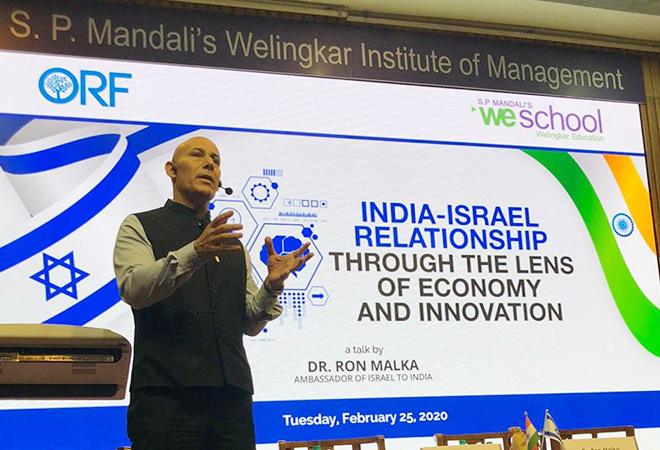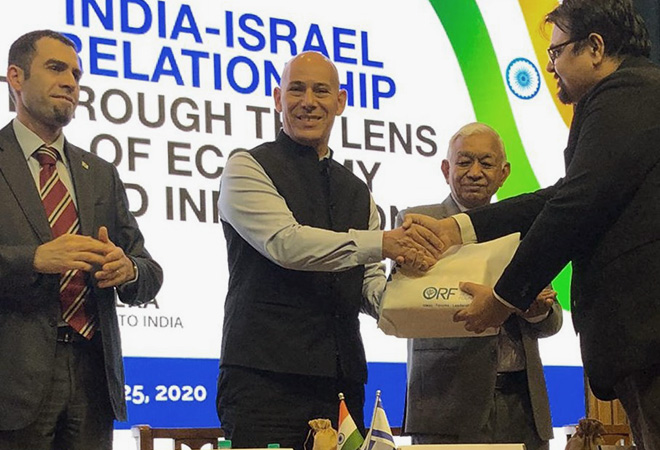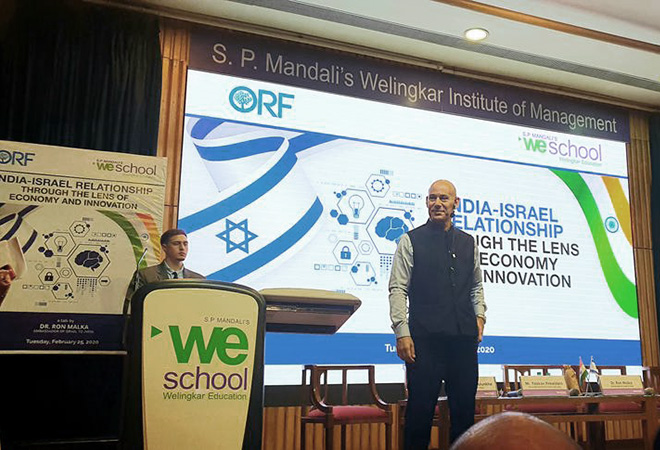


“The Indian and Israeli markets do not compete with one another but complete one another”, remarked Dr. Ron Malka, Ambassador of Israel to India. He was delivering a lecture on India-Israel relationship organised by ORF and Welingkar Institute at Mumbai on 25 February 2020. Dr. Malka traced Israel’s economic growth trajectory that has been largely driven by its innovations in technology sector. He continued to discuss India and Israel’s relationship through the prism of their economies.
Israel, today, has been recognised as one of the world’s most developed economies. Its open and free markets, venture capital availability and technological edge have much to offer to India’s economy. Israel also takes pride in being the country with the lowest unemployment rate amongst the OECD countries. Its declining government debt, which has been less than 60 percent in 2020, is indicative of Israel’s healthy and booming economy. It has also become a frontrunner in exporting high-tech goods and services. Israel has not only emerged as a leader in terms of the most number of patents per capita, but also has the largest number of start-ups per capita. About 300 and more multinational companies have their R&D centres in the country.
Dr. Malka shared some of the important pillars of Israel’s innovation economy – the spirit of entrepreneurship, military capability, open immigration policy and fostering of its creative temper, he said, play a crucial part in the nation’s growth story. Further, Israel’s government considers innovation as a public good and actively encourages innovations at different stages of development. In recent years, the world has witnessed an upsurge in digitisation of all aspects of life. Israel was quick to realise the growing importance of cybersecurity and decided to become leaders in this field. With the integration of academia, military and private sector, Israel was able to successfully fuel its economy in the right direction.
It is here, Dr. Malka stressed, Indians and Israelis share an instant connection with each other. Both countries are tied with the co-principle of democracy. Several success stories have been witnessed in different fields due to Indo-Israeli cooperation. Both countries cooperate not only in defence and security, but also in the fields of space, healthcare, water conservation, agriculture and nano-technology. Dr. Malka recognised India’s growing importance in the international arena and its role in stabilising the world order. Moreover, he brought to light Israel’s inclination to support India’s growth process. Israel is keen to share its technological know-how to help India meet its vision. In order to showcase its agro-technology, Israel has built 28 centers of excellence for agriculture in India. The country has also shared its expertise in ‘precision agriculture’, which, encourages efficient water management with the use of technology. Israel is also leading in the field of digital health; it has the biggest public healthcare insurance agency and is willing to share its experience and digital platforms with India. In terms of education, Indian and Israeli universities have signed more than 20 MOUs and offered around 200 scholarships to Indian students to study in Israel. Some of the other fields in which India and Israel can benefit from each other are tourism, energy and space sectors, he said.
Concluding the talk, Dr. Malka stated that the important factor in the growing partnership between India and Israel, more than all of the different fields of cooperation, is the chemistry of trust and mutual appreciation for one another. This synergetic, successful cooperation strengthens both nations, making them more self-reliant. In future, the collaboration can also foster joint development, R&D, joint design and joint export to third countries. The scope for partnership between the two countries is only bound to deepen and expand in the coming years, he concluded.
This report is prepared by Shruti Jain, research intern, Observer Research Foundation, Mumbai.
